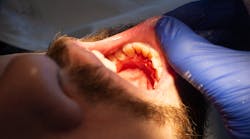AI as effective as dentists in detecting gingivitis
In what researchers hope will be “a valuable screening tool in detecting and diagnosing gum disease,” AI was found able to detect signs of gingivitis as effectively as a dentist’s visual examination, or more than 90% of the time.
The recent collaborative study, led by researchers at the Faculty of Dentistry of the University of Hong Kong (HKU) and published in the International Dental Journal, is one of the first to explore using AI to find signs of gingivitis, such as redness and bleeding along the gumline.
It involved creating and testing an AI model of some 567 frontal-view intraoral images from study participants—80% for training and 20% for validation—with varying degrees of inflammation, with AI able to “identify specific sites with and without gingival inflammation, with high sensitivity and high specificity that are on par with visual examination by a human dentist.”
Consumer satisfaction with dental plans up
A recent survey about dental plans shows a significant increase in customer satisfaction over last year’s results, with strong communication strategies noted as necessary to “showcase plan value to increase customer satisfaction.” The 2023 US Dental Plan Satisfaction Survey was administered by J.D. Power and measured some 1,400 customer responses based on five factors, in order of importance: cost; plan coverage; communication; customer service; and claims and reimbursement. Aetna Dental ranked highest in overall customer satisfaction, with Humana Dental second, and United Concordia Dental third.
ICYMI: Dental researchers discover “bacterial partnership” that worsens caries
In an “unexpected finding that gives us new insights into the development of caries,” researchers have discovered a previously unknown bacterial “partnership” that can play a significant role in increasing caries severity. Previously, Streptococcus mutans was noted as the principal cause of dental caries. But collaborating researchers discovered that a bacterial species called Selenomonas sputigena—previously associated only with gum disease—works in partnership with S. mutans, in effect enhancing S. mutans’ ability to cause tooth decay.



